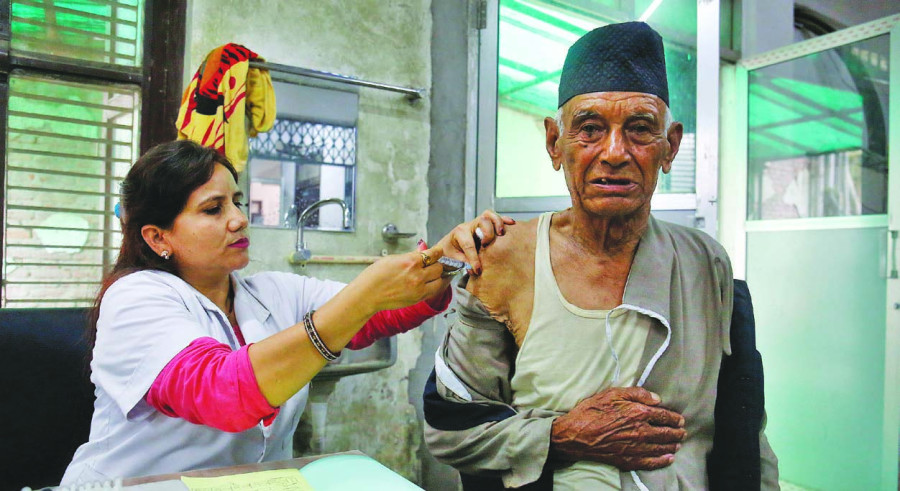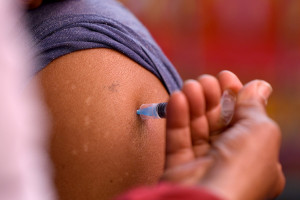Health
Increasing dog bites may hamper Nepal’s aim to end rabies by 2030
Health Ministry to start immunoglobulin treatment from all seven provinces from Sunday.
Arjun Poudel
In the fiscal year 2019-20, altogether 35,250 people throughout the country sought anti- rabies vaccine in state-run health facilities. The number of victims— mostly of dog attacks—rose to 56,619 in the fiscal year 2020-21.
And the number of people who sought anti-rabies vaccine was 22,627 five years ago (in the fiscal year 2016-17)
Nepal aims to eliminate dog-transmitted rabies by 2030, a target set by the World Health Organization, but the government data show that dog-bite cases have been rising every year. As a result, the demand for anti-rabies vaccine has also increased.
“Deaths from the rabies infections have also been constant for the last several years and dog bite cases are also rising,” Dr Samir Kumar Adhikari, joint spokesperson for the Health Ministry, said.
It is estimated that over 100 people die of rabies every year throughout the country, but the Ministry of Health and Population has records of only the deaths that occurred at the Sukraraj Tropical and Infectious Disease Hospital. The hospital’s records show between 15 and 36 people die of rabies every year.
“Both the number of dogs and dog bite incidents are rising,” Dr Krishna Prasad Paudel, spokesperson for the Health Ministry, who is also the director at the Epidemiology and Disease Control Division, said.
“Not all dog bite incidents appear on record or all victims seek the treatment, which is a challenge to preventing the deaths from rabies and a major obstacle to meeting the goal of eliminating dog-transmitted rabies by 2030.”
Another hindrance to preventing the deaths from rabies and meeting the target is lack of awareness and availability of treatment in the major cities only, experts say.
Of the total animal bite victims, especially dog bite victims, 40 percent are children under 15 years old.
Due to the fear of getting scolded by parents or fear of injections, children generally do not tell the parents about such incidents, according to doctors.
And due to lack of awareness about the risks, parents too do not take the dog bites seriously and seek vaccination.
There are also some people who think that anti-rabies vaccination is not required if the dog is a pet.
Doctors say that there are several incidents, in which people died of rabies after being bitten by pet dogs.
The Health Ministry has yet to launch an awareness drive against the risk of rabies infection but decided to provide rabies immunoglobulin treatment from all seven provinces from Sunday.
The Ministry on Thursday organised a press meet and informed about the start of the services.
Rabies immune globulin is used together with rabies vaccine to prevent infection caused by the rabies virus. It works by giving the body the antibodies needed to fight the rabies virus.
The service, which is only available at the Sukraraj Tropical and Infectious Disease Hospital, until now, will be provided from Koshi Hospital in Province 1, Janakpur Hospital and Narayani Hospital in Province 2, Hetauda Hospital and Bharatpur Hospital in Bagmati Province, Pokhara Academy of Health Sciences of Gandaki Province, Lumbini Hospital of Lumbini Province, Provincial Hospital Surkhet of Karnali Province and Seti Provincial Hospital of Sudurpaschim Province, according to the ministry.
People from across the country need to come to Kathmandu for the service until now.
“With the start of the services in the respective provinces, dog bite victims will not have to come to Kathmandu for services, which not only saves time but also out-of-pocket expenditure,” Birodh Khatiwada, minister for Health and Population, said.
Rabies, according to the World Health Organisation, causes 59,000 agonising and painful deaths globally every year, one person every nine minute, mostly children and the poor. The disease, while fatal, is 100 percent preventable if there is access to vaccines and life-saving treatment in the event of dog bites.




 22.28°C Kathmandu
22.28°C Kathmandu















